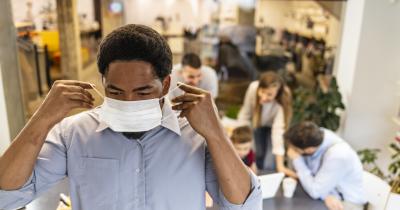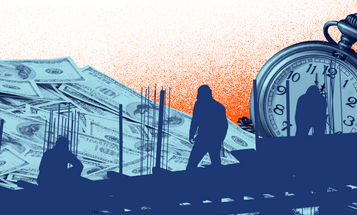
Back to Work or Else? Risky Reopening Policies Put Black and Brown Workers in Danger
We're all seeing systematic efforts to shift the economic and health risks of the pandemic from governments and employers and onto the backs of disproportionately Black and brown workers.

Public health experts have been very clear about what steps are necessary for Americans to begin safely resuming normal activity: In the absence of a vaccine or treatment for COVID-19, states and regions need to see a sustained drop in cases, and have the ability to test large numbers of people, trace contacts, isolate people who have been exposed, and provide medical care. Easing public lockdowns before guidelines have been met will lead to “suffering and death that could be avoided,” according to the nation’s top infectious disease expert, Dr. Anthony Fauci. And yet some states, ignoring the pleas of local officials, have rushed to reopen without meeting public safety criteria, some with cases still on the rise.
As the impact of COVID-19 continues to follow historic patterns of structural racism, it is Black and brown people who are disproportionately likely to suffer and die. According to the CDC, Black people make up 27 percent of COVID-19 cases despite the fact that they are just 13 percent of the overall U.S. population. Latinx people make up 28 percent of cases despite being just 18 percent of the overall population.
Policymakers should listen to the concerns of the most severely impacted communities. A recent survey of Black Americans by African American Research Collaborative, Yale School of Medicine, and the NAACP finds that 8 in 10 respondents agree that, rather than ending the shutdown, the country “should hold off on reopening businesses until we can assure safety.”
[I]n some cases lawmakers are actively pursuing policies likely to push Black and brown people into work environments that may be very hazardous.
Yet not only are many states reopening before safety is assured, in some cases lawmakers are actively pursuing policies likely to push Black and brown people into work environments that may be very hazardous.
Republican leaders in the House and Senate have said that they will not agree to any additional COVID-19 stimulus unless businesses receive immunity for coronavirus-related lawsuits if workers or consumers get sick as a result of a company’s unreasonable actions. If Republicans get their wish, workers and customers will not be able to hold companies accountable in court even if these companies fail to take commonsense protective measures—such as enabling sick workers to stay home, offering more time for handwashing, or providing masks and gloves—to prevent exposure to coronavirus. Corporate immunity would provide a dangerous incentive for businesses to cut corners on safety. It’s no wonder that there is broad bipartisan opposition to granting businesses immunity from COVID-19 lawsuits.
With few ways to hold employers accountable for providing safe work environments, workers are understandably reluctant to return to a job that could expose them and their families to serious illness. Congress enhanced and expanded unemployment insurance in the last stimulus bill, enabling many working people to make ends meet without having to venture into a hazardous work environment.
Now in the rush to reopen, some governors are threatening that people who refuse work will have their unemployment benefits cut off, eliminating what may be their families’ sole means of support. States like Ohio are urging employers to report anyone unwilling to return to work out of fear of a potentially deadly infection. The National Employment Law Project, joined by Demos and more than 200 other organizations, points out that under federal law working people have a right to refuse to go back to workplaces that are hazardous to their health and well-being. Yet the Department of Labor, turning its back on its mission of protecting workers, is encouraging states to curtail support for workers unwilling to expose themselves to danger. Black and brown households, which face higher unemployment rates and have fewer resources than the typical white household to cushion the blow of lost income, have the least ability to stay home when employers and policymakers are bent on pushing them back to work.
Corporate immunity and cutting off unemployment benefits are a one-two punch.
Corporate immunity and cutting off unemployment benefits are a one-two punch, forcing Americans into potentially hazardous work environments at high risk of exposure to coronavirus. Together, these measures shift the society-wide economic and health risks of coronavirus away from governments and employers and onto the backs of disproportionately Black and brown workers who can least afford to bear them.
Surveying the scenes of anti-lockdown protestors, some carrying confederate flags and swastikas, Rashad Robinson, president of Color of Change, observed to The Hill: “White folks are at Capitols with guns demanding Black people go back to work.” In many cases, the federal and state governments are using their power to the same effect.




